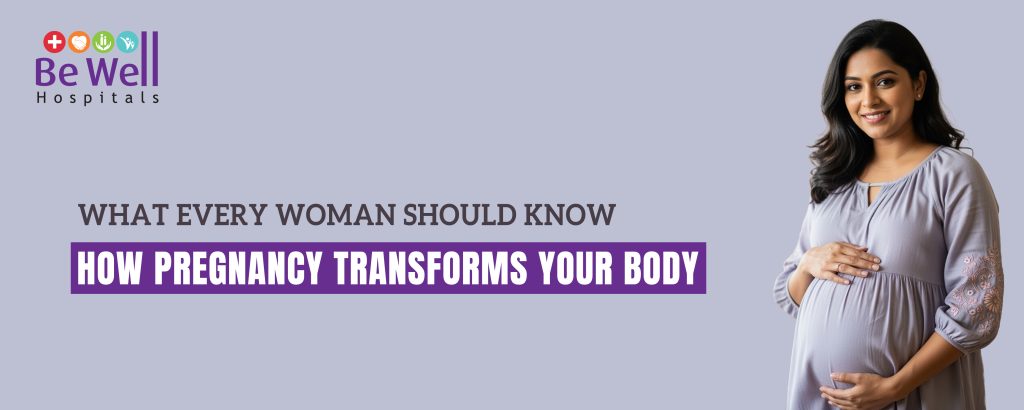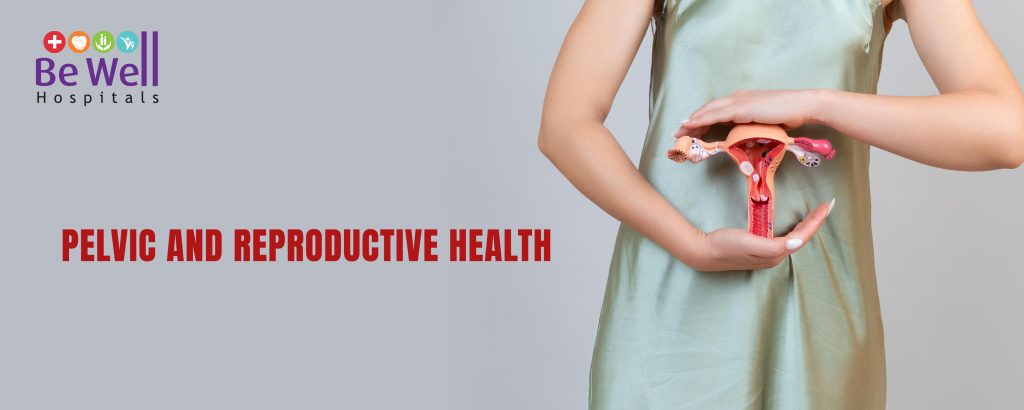Introduction
Pregnancy is a profound journey, transforming a woman not only physically but also emotionally and mentally. It’s a time of anticipation and change, where nearly every system in the body adjusts to nurture and sustain new life. From hormonal surges and physical transformations to emotional shifts and long-term health effects, understanding these changes can help women feel more empowered, prepared, and supported during this extraordinary phase.

Hormonal Changes and Their Ripple Effects
Hormones like estrogen, progesterone, and hCG (human chorionic gonadotropin) surge throughout pregnancy, driving a wide range of bodily responses. Common Effects of Hormonal Changes are
- Mood swings, irritability, or heightened emotions
- Skin changes: acne or the famous “pregnancy glow”
- Hair thickening or hair loss
- Sleep disturbances
- Nausea, fatigue, and food aversions
These hormonal shifts are natural and essential for fetal development, but they can feel overwhelming. Emotional support and self-care routines help in navigating these fluctuations more comfortably.
Physical Changes: More Than Just the Baby Bump
The body undergoes both internal and external changes during pregnancy in order to support the baby. Some key Physical Changes includes
- Weight gain and water retention
- Swelling in feet, hands, and face
- Postural shifts and lower back pain
- Increased blood volume to supply oxygen to the baby
- Muscle and joint softening for childbirth preparation
Staying physically active with pregnancy-safe exercises, maintaining posture, and eating a balanced diet can significantly ease discomfort.
Mental and Emotional Health
Pregnancy affects the mind just as deeply as it does the body. As they get ready to give birth and become mothers, many women feel a mixture of happiness, excitement, fear, and anxiety. Hormonal changes can intensify mood swings and emotional sensitivity, sometimes leading to prenatal or postpartum depression. It’s important to acknowledge these feelings and understand that they are completely natural. Open communication with partners, family, or friends can offer much-needed reassurance. Practices like meditation, prenatal yoga, and breathing exercises help calm the mind, while professional counselling can be a lifeline when emotions feel overwhelming. Prioritizing mental health during pregnancy is essential not just for the mother’s well-being but also for the healthy development of the baby.
Immune System Adjustments
During pregnancy, a woman’s immune system undergoes a delicate balancing act—softening just enough to protect the growing baby while still defending against everyday infections. This natural shift makes expectant mothers slightly more vulnerable to colds, flu, and other common illnesses. It’s the body’s intelligent way of preventing rejection of the fetus, but it also means added care is essential. Changes in inflammation and immunity can subtly impact how the body responds to germs. That’s why maintaining good hygiene, eating immunity-boosting foods, and staying up to date with prenatal vaccinations are crucial steps. A mindful approach to immune health helps keep both mother and baby safe throughout the pregnancy journey.
Long-Term Health Implications
Some changes during pregnancy can have lasting health consequences, especially if not monitored or managed effectively. Some potential long-term impacts are
- Gestational diabetes which may lead to Type 2 diabetes
- Preeclampsia increases the risk of high blood pressure
- Bone density loss due to calcium deficiency
- Persistent back or pelvic pain post-delivery
- Postpartum depression if untreated can continue long after childbirth
Regular follow-up visits, physical rehabilitation, and mental health support help women bounce back effectively.
Managing Pre-existing Conditions
Pregnancy places additional stress on existing health issues, requiring more attentive and specialized care. It can also intensify pre-existing health conditions like diabetes, hypertension, asthma, or autoimmune disorders. These conditions require closer monitoring, tailored care, and expert coordination to ensure the safety of both mother and baby. Your obstetrician may work closely with other specialists to adjust medications, monitor your condition closely, and make sure both you and your baby stay safe. With proper medical care and support, even complex health issues can be managed well—helping you enjoy a healthy, stress-free pregnancy and a safe delivery.
Nutritional Demands and Depletion
Pregnancy increases the need for certain nutrients critical to both mother and baby’s health. Some key Nutritional needs are
- Iron – Prevents anemia
- Folic Acid – Prevents neural tube defects
- Calcium – Supports bone health
- Protein – Builds tissues and supports growth
A nutrient-rich diet supported by prenatal vitamins ensures healthy development and reduces fatigue and complications.
Pelvic and Reproductive Health

As your pregnancy progresses, the growing baby and expanding uterus place increasing pressure on your pelvic area, which can gradually weaken the pelvic floor muscles. This often leads to concerns such as urinary incontinence, vaginal discomfort or tearing after childbirth, and strain on reproductive organs—especially following complicated deliveries. But the good news is, recovery and prevention are absolutely possible. Incorporating daily Kegel exercises, seeking guidance from a postpartum physical therapist, or enrolling in a dedicated pelvic floor rehabilitation program can significantly strengthen this area. With the right care, you can regain control, confidence, and comfort—helping you feel your best through motherhood and beyond.
Postpartum Recovery: The Fourth Trimester
Recovery doesn’t end with childbirth—it’s just the beginning of a new phase often called the “fourth trimester.” This critical period brings a mix of physical changes, emotional shifts, and sheer exhaustion. From vaginal soreness and bleeding to fluctuating hormones, breast discomfort, and sleep deprivation, the body undergoes intense healing. Add to that emotional highs and lows, and it’s clear why postpartum care is essential. Prioritizing regular postnatal check-ups, eating nutritious meals, staying hydrated, resting when possible, and asking for help can make a world of difference. Most importantly, never ignore your mental health—seeking support is a strength, not a weakness. With care, patience, and the right guidance, you can emerge from the postpartum journey stronger, healthier, and more empowered than ever.
Multiple Pregnancies and Health
With each subsequent pregnancy, a woman’s body endures more physical stress and recovery challenges. Some possible challenges are
- Increased fatigue and nutrient depletion
- Higher risk of gestational complications
- Weakened pelvic muscles
- Longer postpartum recovery
Maintaining a healthy lifestyle, engaging in physical therapy, and having regular medical supervision can ease these challenges.
Positive Health Outcomes Post-Pregnancy
Despite the challenges, pregnancy often leads to new strengths—both physical and emotional. Some potential benefits are
- Improved cardiovascular function (short-term)
- Boosted immunity
- Increased emotional resilience
- Heightened health awareness
- Stronger bond with one’s body and health choices
Many women adopt healthier habits like balanced diets, regular exercise, and mindfulness, which benefit them for life.
Conclusion
At Be Well Hospitals, we are committed to supporting women at every stage of their pregnancy journey—from planning and conception to delivery and postpartum care. Our team of experienced obstetricians, gynecologists, nutritionists, and mental health professionals work together to ensure your well-being and that of your baby. Whether you’re preparing to conceive, currently expecting, or in the healing postpartum phase, we’re here to guide and care for you.
For expert pregnancy care and compassionate support, call 9698 300 300 or visit your nearest Be Well Hospitals.
